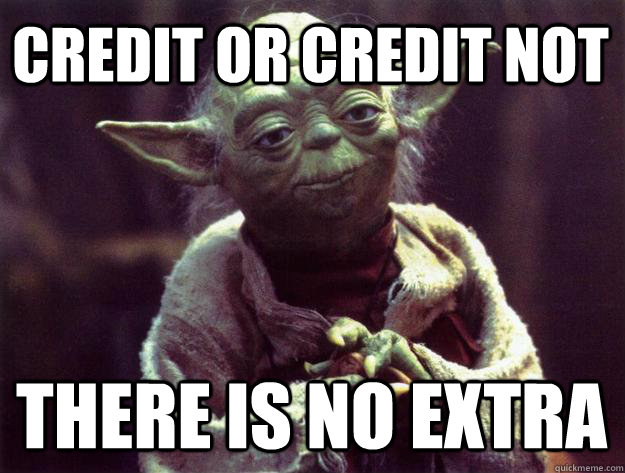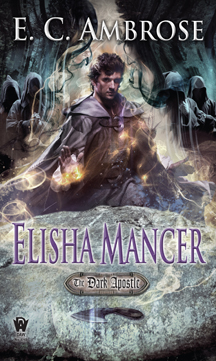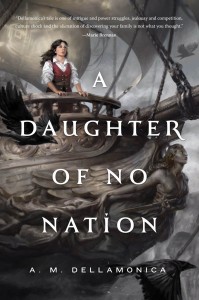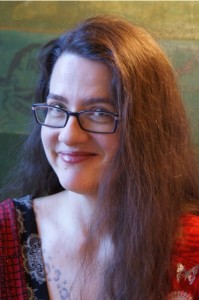Or: Recent and Upcoming Debuts in Fantasy and Science Fiction... that just happen to be written by women.
Charlie invited me to come by and join in the posts helping those who may not already be in the know to find the wealth of writers who also happen to be female that they can't otherwise find when they are writing those excellent "where are all the women writers of fantasy and science fiction" posts.
I began to make a list of 'next-generation writers' who also happen to be women. (Since we don't write with our gender identities or genitalia, I figured it would be fine to not modify the word "writer," but for the search engines, I'll add it at in the end, so you know, they can find us. When they look.)
The problem seemed to be that there were so many of us who were otherwise hard to find! The entire list would crash the Internet out of pure hard-to-findness! And so Charlie set me a boundary, limiting me to 20, leaving off many excellent writers. I've thus kept this list focused on 2014 and 2015 English-language debut books in Science Fiction, Fantasy, and YA SFF. Many of these authors have new books coming out in 2015 and 2016 as well. I'll let the comments about those I've not put on this very short list stand as a reminder to you that we are NOT, in fact, hard to find.
- Andrea Phillips - Revision (Fireside Fiction 2015) Science fiction
- Zen Cho - Spirits Abroad (Fixi Novo, 2014) Linked short stories/Fantasy
- Silvia Moreno Garcia - Signal to Noise (Solaris 2015), Fantasy/Slipstream
- Ilana C. Myer - Last Song Before Night (Tor, 2015) Fantasy/Epic
- Stephanie Feldman - Angel of Losses (Ecco, 2014) Historical Fantasy/Slipstream
- Genevieve Cogman - The Invisible Library (Tor, UK) Fantasy/Alternate Worlds
- Beth Cato - The Clockwork Dagger (Harper Voyager, 2014) Steampunk
- Alyc Helms - The Dragon of Heaven (Angry Robot, 2015) Fantasy
- Karina Sumner-Smith - Radiant (Talos, 2014) Fantasy
- Stacey Lee - Under a Painted Sky (Putnam, 2015) Alt-Historical Western, fantasy
- Sabaa Tahir - An Ember in the Ashes (Razorbill, 2015) YA Fantasy
- Jacey Bedford - Empire of Dust - (Daw 2014) Fantasy
- Susan Murray - The Waterborne Blade (Angry Robot 2015) Fantasy
- Carrie Patel - The Buried Life (Angry Robot, 2015) Fantasy
- Heather Rose Jones - Daughter of Mystery (Bella, 2014) Romance/Historical Fantasy/Queer
- Nicola Yoon - Everything, Everything (Delacorte, 2015) YA Science Fiction
- A.C. Wise - The Ultra Fabulous Glitter Squadron Saves the World Again (Lethe 2015) Linked short stories/Sci-fi/Queer
- Monica Byrne - The Girl in the Road (Crown, 2014) Science Fiction
- Camille Griep - Letters To Zell (47 North, 2015) Fantasy
- me - Updraft (Tor, 2015) Fantasy
As I stipulated above, this list is defined purely by time, debut-status, and the number 20.
I'd love to add the writers who debuted in the years before us - including but not in any way limited to: N.K. Jemisin, Ann Leckie, Marjorie Liu, Alaya Dawn Johnson, Jodi Meadows, Genevieve Valentine, Justina Ireland, Jaime Lee Moyer, Stina Lecht, Jacqueline Koyanagi, V.E. Schwab, Mur Lafferty, Nene Ormes, Sarah McCarry, Leah Bobet, Natania Barron, Aliette de Bodard, Emma Newman, Alyx Dellamonica, Jaye Wells, Emily St. Jon Mandel, Kameron Hurley, Charlie Jane Anders...
AND the writers who came before that, including Nnedi Okorafor, Elizabeth Bear, Nisi Shawl, Kate Elliot, Kandace Jane Dorsey, Jo Walton, Martha Wells, Laura Anne Gilman, Amanda Downum, Gwenda Bond, Suzanne Collins, Nalo Hopkinson, Mary Robinette Kowal, Sarah Monette, Naomi Novik, Caitlín R. Keirnan, Rae Carson, Linda Nagata, Catherynne Valente, Kelly Link, J.K. Rowling,...
And those who came before that: Emma Bull, Judith Tarr, Elizabeth Lynn, Jo Clayton, Robin Hobb, Suzy McKee Charnas, Pamela Dean, Ellen Kushner, Brenda Cooper, Tanya Huff, Janet Morris, Robin McKinley, Michele Sagara, Tricia Sullivan, Delia Sherman, Sherwood Smith, Jessica Amanda Salmonson, Karen J. Fowler, Cecelia Holland, Nicola Griffith, CS Friedman ...
And the Grands and Great Grands and so on, like Pat Cadigan, Joan D. Vinge, Margaret Atwood, Kate Willhelm, Jane Yolen, Connie Willis, Andre Norton, Nancy Kress, Ursula K. Le Guin, Octavia Butler, Lois McMaster Bujold, Doris Pischeria, C. L. Moore, Carol Emshwiller, Leigh Brackett, Joanna Russ, James Tiptree Jr., Anne McCaffrey, Diana Wynne Jones, Joan Aiken, C. J. Cherryh, Andre Norton ... all the way to Mary Shelley and beyond. AND everyone here: http://www.womeninsciencefiction.com/?page_id=54, here: https://www.goodreads.com/list/show/6934.Science_Fiction_Books_by_Female_Authors, and here: https://www.goodreads.com/list/show/38909.Speculative_Fiction_Classics_pre_1980_by_Female_Authors.
AND the coming wave of 2016: here are just a few - Ada Palmer, Laura Elena Donnelly, Mishell Baker, Malka Older... And the editors. And the critics. And the publishers.
And and and... (honestly, I asked five friends to list their favorites and after fifteen minutes had to beg them to stop because my buffers overflowed.)
Oh my goodness, you would think it hard to find women writing fantasy and science fiction given those blog posts and articles.
BUT IT'S NOT.





